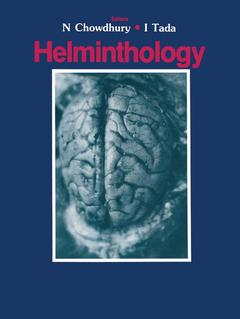Description
Helminthology, Softcover reprint of the original 1st ed. 1994
Coordinators: Chowdhury Nirmalendu, Tada Isao
Language: French
Keywords
Publication date: 01-2012
373 p. · 21x28 cm · Paperback
373 p. · 21x28 cm · Paperback
Description
/li>Contents
/li>
Study of parasitology, like any other branch of biological science, has in recent years been increasingly revealing and rewarding with enrichment and embellishment by basic sciences, specially with application of spectacular advances in molecular biology and biotechnology. Such a fruitful fusion of more than one discipline has now come to characterise more than ever before our approach to the subject. This volume of helminthology with contributions from a galaxy of distinguished scientists in specific areas, bears an eloquent testimony to the gratifying yield that accrues from cross fertilisation of multiple disciplines and able support from basic sciences. Matazoan parasites, helminths, living in more than one host in different stages of development, present an intricate spectrum of host-parasite relationship, which has evolved through diverse frame and flow of ecologic circumstances. The situation is further complicated, as elaborated here, by genotypic and phenotypic variations, which profoundly influence the dynamic interaction between hosts and parasites and determine consequently survival and propagation of the latter. Indeed, one of the important messages upheld in this book is that genetic endowment of parasites plays a pivotal role in their immunogenicity, pathogenicity, response to variable environmental composition, including drug response and also their transmission dynamics and epidemiology. Evolution of parasitic helminths with concomitant physiologic and morphologic alterations have been traced from free-living stage to development of host-specificity of different degrees and parasitic speciation.
1. Evolution, Parasitism and Host Specificity in Helminths.- 2. Epidemiology of Some Helminth Infections of Domesticated Animals in the Tropics with Emphasis on Fasciolosis and Parasitic Gastroenteritis.- 3. Helminths of Domesticated Animals in Indian Subcontinent.- 4. Nematode-Cestode Zoonoses.- 5. Genetic Variation in Helminths and Its Epidemiological Significance.- 6. Ultrastructure of Helminths.- 7. Biochemistry of Helminths.- 8. Pathophysiology of Helminth Infections.- 9. Host Responses to Helminths with Emphasis on Eosinophils and Mast Cells.- 10. Antigens of Parasitic Helminths in Protection and Pathology.- 11. Application of Radioisotopes in Pathophysiology and Diagnosis of Helminthic Infections.- 12. Immunodiagnosis of Helminthic Infections.- 13. Application of Radiation in the Control of Helminthic Infections.- 14. Chemotherapy of Helminths of Livestock and Man.- 15. Genetic Control of Immunity to Helminths.
© 2024 LAVOISIER S.A.S.




